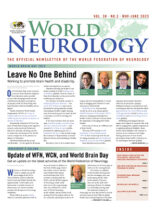Get an update on the latest activities of the World Federation of Neurology.
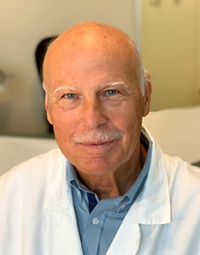
Wolfgang Grisold
By Wolfgang Grisold
Welcome to World Neurology. I want to update you on the proceedings of the WFN. This newsletter, which is edited by Steven Lewis and Walter Struhal, has approximately 15,000 readers and has become a valuable resource of information, not only for member societies, but all aspects of neurology worldwide.
Please follow us on our website, which is constantly updated as well as on social media. In addition to the front website page, look at the toolbar, and you will find more detailed information on World Brain Day, WFN activities, including with the WHO, and the World Congress of Neurology, where a link takes you to the congress page. Also, you will find the current issue of World Neurology on the website, and an archive of all existing World Neurology editions. We are constantly uploading new pieces of information on the front page as well as on the rotating banner.
The trustees, in addition to the monthly meeting, have two live meetings a year, one in the spring and the other in the autumn. This year, they met at the April AAN meeting in Boston. In addition to a leadership meeting with the American Academy of Neurology, we were also invited to several activities, such as Head Talks on global health topics and participation in the Joint Committee on the Continuum program.
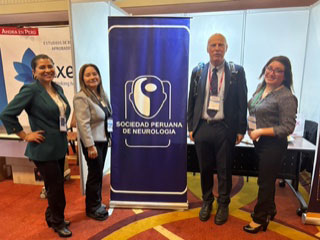
Visit at the stand of the Peruvian Society of Neurology in Lima.
The AAN, as all regional societies, will also participate at the World Congress on Neurology with joint lectures, and we’re glad about these fruitful cooperations. At the upcoming EAN meeting, which is the regional European meeting, the WFN will participate in several meetings. I am happy to report that the WFN also participated in the Pan American Federation of Neurological Societies (PAFNS) meeting in Lima, Peru. The images show the historic program of the first American congress in 1963, the booth of the Peruvian society at the PAFNS congress, and an image showing the stroke unit in the National Institute of Neurology in Lima, Peru.
We will also participate in the next meeting of the Indian Academy of Neurology in September for the Asian region. As reported before, the WFN was able to attend the PAUNS meeting in Jeddah in January 2023. The AFAN will not hold a meeting this year, but we will participate in the joint Regional Training Course (RTC) asa well as organize two educational days for Africa.
World Congress of Neurology
The WCN will be in Montreal from Oct. 15-19, 2023, and we look forward to this in-person congress, which will also have a virtual part, and thus will be hybrid. This has several reasons. We consider a hybrid part important, we will be able to reach more persons worldwide, who can not travel for visa issues, financial reasons, or other causes. Also, the congress participants will be able to look at the program at sessions, which they may have missed.
The preparations are developing smoothly, and we have the great support of the Canadian Neurological Society and our Professional Congress Organizer (PCO) Kenes. On the day before the meeting, we will have a patient day, following the successful tradition of Vienna and Kyoto congresses, and will be targeted at patients and patient organizations, to communicate new developments in neurology, at the occasion of the congress.
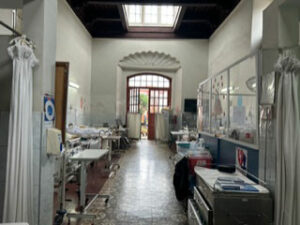
Stroke Unit in the National Neurological Institute in Lima, Peru.
The WCN program will contain 10 plenary sessions, scientific topics often jointly with other societies, free presentations, posters (live and e-posters, for persons who can only participate virtually) and a large number of teaching courses. In addition this year, we will have a few new items such as lectures designed by young neurologists, debates, Meet the Professor sessions, and open “coffee” sessions where topics can be discussed with a small faculty. Needless to say, the Tournament of the Minds will be continued during the congress.
There will also be WFN awards given, such as the Angela Vincent Award for Young Researchers, as well as the Ted Munsat Award for Education, which will be co-sponsored by the AAN. Elsevier, the publisher of our journals JNS and eNS will donate three awards for the best scientific abstract and three awards for the best clinical abstract.
I am happy to report that the concept of the WFN Training Centers started in 2013 in Rabat, and we will take this opportunity to have a celebration session on the occasion of 10 years of training centers of the WFN. We welcome you to attend.
The meeting is expected to be accredited by the UEMS EACCME, which also includes accreditation by the Canadian Royal Society and the AMA. We are aware of the importance of CME/CPD for meetings, and we will have a special educational session by experts from the UEMS on this important topic.
We have also created an attractive opening and reception, and the networking event, which will give the opportunity for informal exchanges.
We are thankful for industry support, and we expect to also have exciting industry-sponsored symposia, as well an attractive exhibition.
There will be a Council of Delegates (CoD) meeting in Montreal giving an overview on the activities of the WFN. There will also be elections for the position of treasurer and of a trustee. The Nominating Committee of the WFN is an independent committee composed by regional experts, and chaired by Raad Shakir (past, past-president). We have had many valuable applications from the regions and the task of this committee was to create a shortlist of candidates. This shortlist is published now online, and also statements from the suggested candidates are in this issue. According to the rules of the WFN, any other candidate supported by five member societies can apply until 30 days before the election. These additional candidates will be published online according to that timeline. We thank all applicants for the position for their enthusiasm to support the WFN.
The next WCN will be in Seoul, South Korea, in 2025, and the first meetings will start taking place in Montreal as the preparation for such events usually last two years.
World Brain Day
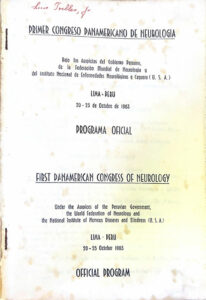
Historic program cover from the first Panmerican Congress in 1963. Congress president Oscar Trelles.
In July 22, the WFN celebrates its foundation, and since 2014, we celebrate a WBD on different topics and with changing partners in previous years. This year’s topic is “Brain Health and Disability.” It is based on the successful campaign for brain health in the past year, and the regional societies as well as the World Federation of Neurorehabilitation are partnering with us. The topic was chosen to raise awareness on disability in neurological diseases. As neurological diseases are the most frequent cause of disability, this topic is highly relevant as according to the Global Burden of Diseases (GBD), neurological diseases are the most frequent cause of disability. Disability, looking from history until present times, has been subject to many cultural and ethical influences and stigma. For neurological diseases, it will be important to more clearly define the individual types of disability for different diseases.
Fortunately, a number of disabilities are transient and reversible or can be improved by rehabilitation. However, a large number are permanent, and often progressing. It is important that the U.N. considers disability as a human right, and not being subject to charity. Yet for many reasons, such as socioeconomic factors, regional, and cultural aspects, we still have a long way to go.
This WBD is intended to alert on the importance of disability in neurological diseases and alert awareness, and hopefully will create new working groups to define disability in neurological diseases, and most importantly, stimulate treatment and procedures.
We want to remind our readers that as in previous WBDs, we have created a toolkit, which is available for all member societies on the website. This toolkit can be used freely for the organization of a local WBD, which gives a good chance to bring awareness of disability and also the importance of neurology. We will be supporting this activity by press mailings, social media, and on the WBD, we will have a webinar on brain health and disability.
Global Activities
The WFN with 123 member states, six regions, and the Global Neurology Alliance, are a strong and powerful association. We are glad to fulfill the criteria to be a non-state actor (NSA) with the WHO and the UN ECOSOC. This gives us the opportunity to hear and learn of these global health activities, as well as attend some meetings and raise the voice of neurology, either in specific collaborations, or “interventions” at meetings. This year, we have attended several meeting virtually and in person, and I would like to mention the 75th Health Assembly in Geneva, where the WFN attendance was shared between trustee Alla Guekht and myself.
Also, on this occasion, the WFN was able to make an intervention. The introduction of the activities of the WHO in the past year are impressive, and from the standpoint of neurology the eradication programs of polio, and also the success in malaria vaccination will have direct influence on neurological diseases. Sadly, the Intersectoral Global Action Plan for Epilepsy and other Neurological Disorders (IGAP) and the importance of its implementation was not included in the achievements from last year.
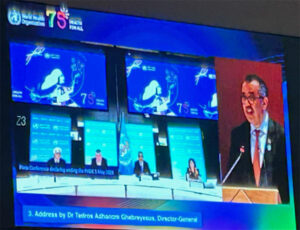
The 75th World Health Assembly in Geneva. Report by the director general, Tedros Adhanom Ghebreyesus.
The main activity at present for neurology in cooperation with the WHO is the IGAP, which has been discussed several times in the editorial, and in World Neurology. Also, a short summary written by the trustees is available on the website, as published in the Journal of the Neurological Sciences. I want to remind readers that the WHO paper is a unique opportunity for neurology worldwide, and also reminds us that neurology is not only science and practice, but needs to involve public health work (World Health Organization. Draft intersectoral global action plan on epilepsy and other neurological disorders 2022-2031.)
The content of the IGAP could not be more favorable for the worldwide improvement or even implementation of neurology in all aspects of health care. Yet, from the neurological WFN community, and based on several personal interactions, as well as a survey from the WFN asking delegates and societies on their knowledge and awareness of the IGAP it created a response of only 20%, after two subsequent surveys we know that the acceptance and practical use of IGAP could be better. This raises concerns, as not being aware of this important tool, it does not allow to use it although it is bitterly needed in some parts of the world. There are of course exceptions, and efforts are being made to implement the IGAP in the health system by some member societies.
The WHO is working on a toolkit for better visibility and implementation of the IGAP, and the WFN will be pleased and helpful in distributing this activity.
Finally, I would like to add a list of important WFN dates.
- WBD and the WBD webinar: July 22, 2023 (Free access)
- WFN IHS Education Day: Sept. 23, 2023 (Free access)
- WCN Montreal: Oct. 15-19, 2023: See the Congress website.
- WFN AON Educational Day for Asia on Stroke: Nov. 18, 2023 (Free access)
- ICNMD virtual update; Virtual Neuromuscular update conference by the Specialty Group on Neuromuscular diseases. Virtual 2-day meeting. For low-income countries, a contingent of free participation for young neurologists will be announced. Please check the website. Nov. 30-Dec. 1, 2023
- WFN AFAN Education Day on Neuropathies: Dec. 2, 2023 (Free access) •
